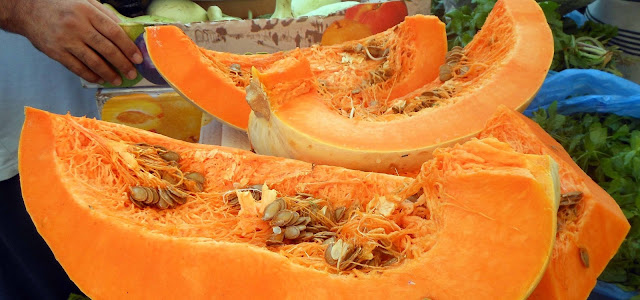A few months ago I published a healthy vegan guide for the Palestinian Territories which the Palestinian Territories based vegan/animal rights organization PAL (Palestinian Animal League) has translated into Arabic.
A new study has just been published in
the prestigious medical journal The Lancet confirming that vitamin D and
vitamin A are two important nutrients to pay some attention to – not just for
vegan children but for most children (and adults) in the Palestinian
Territories (and practically everywhere else). The study was conducted by
researchers from The London School of Hygiene & Tropical Medicine, UNICEF
Iraq and the Nutrition Department at the Palestinian Ministry of Health.
Good source
of provitamin A: pumkins (grown in the Gaza Strip)
Where does the new data come from?
The Palestinian Micronutrient Survey
in 2013 tested vitamin A status in blood samples of 1054 children (569 children
in the West Bank and 485 children in the Gaza Strip) and vitamin D status in
blood samples of 150 children (75 children in the West Bank and 75 children in
the Gaza Strip). The children were ages 6 months to 5 years old.
Study results:
- 771 (73%) children in the survey had vitamin A deficiency, and 91 (61%) children had vitamin D deficiency.
- Compared with children living in the West Bank, children living in the Gaza Strip were about 30% more likely to be deficient in vitamin A, and about twice as likely (100% more likely) to be deficient in vitamin D.
- Vitamin A deficiency was especially common in children with anaemia. For more information great sources of iron and vitamin B12 (a deficiency of these nutrients can cause anaemia) see the Healthy vegan guide for the Palestinian Territories.
- Vitamin D deficiency was almost three times more common in girls compared to boys – this emphasizes that clothing and/or staying inside or in the shade all day long might be a health risk especially for Palestinian girls.
- Vitamin A deficiency was defined as < 1.05 μmol/L vitamin A in the serum. Vitamin D deficiency was defined as < 50 nmol/L (20 ng/mL) 25-OH-D in the serum. (The exact parameters are not stated in the article which was only published as an abstract.)
Do Palestinian children need vitamin D and vitamin A supplements?
The study authors describe a “low
adherence to the full supplementation regimen” – probably supplements given out
by UNICEF. If exposure to sunshine is
possible and if weekly consumption of
sufficient amounts of vegetables is possible then supplementation of both
of these nutrients is not necessary – in healthy children.
Good source
of provitamin A: orange-fleshed sweet potatoes (grown in the Gaza Strip)
Avoiding vitamin D and vitamin A deficiencies:
Vitamin A and vitamin D are very
important for good health, and both vitamins are easy to obtain – also from
animal friendly (vegan) sources.
Great sources of vitamin D: Sunshine –
it is important that all children (and adults) receive direct sunshine on their
skin. It is important not to cover all of your body all of the time. The
Palestinian Territories receive plenty of sunshine year-round – so exposing
some naked skin to sunshine for 10 or 20 minutes daily is likely a feasible
option for most people.
For more
information see the Healthy
vegan guide for the Palestinian Territories.
Great sources of vitamin A: All cooked orange vegetables, cooked dark
green leafy vegetables an orange-fleshed fruits are good sources of beta-carotene (provitamin A).
For more
information see the Healthy
vegan guide for the Palestinian Territories.
Good sources
of provitamin A: cantaloupe melon, and tomatoes also contain some provitamin A (grown in the Gaza Strip)
Reference
Chaudhry A, Hajat S, Rizkallah N, Abu-Rub
A: Risk factors for vitamin A and vitamin D deficiencies in children younger
than 5 years in the occupied Palestinian territory: a cross-sectional study.
Lancet (2018) Feb 21;391 Suppl 2:S3. doi:
10.1016/S0140-6736(18)30369-6 . Epub 2018 Feb 21.




